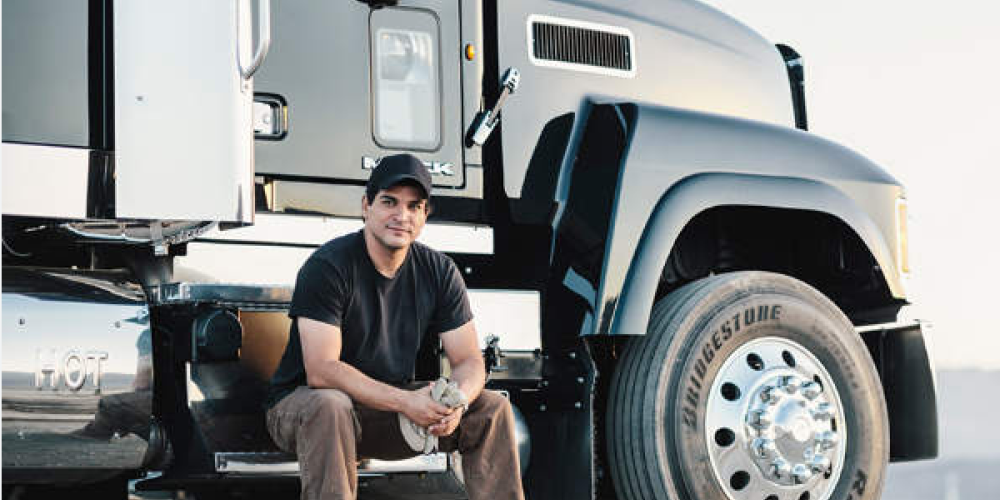News Post

OTR (Over-the-Road) truck drivers are individuals who drive heavy trucks over long distances, transporting goods and products across the country. These drivers play a critical role in the economy, as they are responsible for moving a vast majority of the products we use in our daily lives. From food and clothing to electronics and construction materials, OTR truck drivers help ensure that goods are delivered to their intended destinations in a timely and efficient manner.
In this blog, we'll take a closer look at the world of OTR truck drivers. We'll explore their daily lives, the equipment, and technology they use, and the health and wellness challenges they face.
The Daily Life of an OTR Truck Driver
For OTR truck drivers, life on the road can be challenging, yet rewarding. These drivers spend the majority of their time behind the wheel, driving long distances to deliver goods and products across the country. Let's take a closer look at what a typical day in the life of an OTR truck driver might look like.
Typical Schedule and Workload
OTR truck drivers work long hours, often spending days or even weeks away from home. They typically work 70 hours over eight consecutive days, with a mandatory 34-hour rest period before they can start their next work week. During their work week, drivers may spend up to 11 hours a day driving, with additional time spent loading and unloading cargo, completing paperwork, and conducting routine maintenance on their vehicles.
Challenges of Long-Haul Driving
Driving for long hours on end can be physically and mentally exhausting. OTR truck drivers face many challenges on the road, including traffic congestion, adverse weather conditions, and the risk of accidents. They also spend extended periods away from their families and loved ones, which can take a toll on their mental health and emotional well-being.
Coping Mechanisms and Strategies
To cope with the challenges of life on the road, many OTR truck drivers rely on various coping mechanisms and strategies. Some drivers use music, audiobooks, or podcasts to help pass the time while driving, while others may choose to stop and take breaks to stretch, exercise, or explore local attractions.
Additionally, many OTR truck drivers rely on the support of their fellow drivers and the trucking community as a whole, which can provide a sense of camaraderie and support while on the road.
Health and Wellness for OTR Truck Drivers
OTR truck driving can be a physically and mentally demanding job, and drivers need to prioritize their health and well-being. There are some things that drivers can do about that. The most important tips for better health and wellness are: staying active, eating healthy, getting enough sleep, taking breaks, and staying hydrated.
Risks and Health Issues Associated with the Job
OTR truck driving is a sedentary job, which can increase the risk of health issues such as obesity, diabetes, and cardiovascular disease. Drivers may also experience sleep deprivation and fatigue, which can impair their cognitive function and increase the risk of accidents on the road. Additionally, OTR truck drivers may experience loneliness and isolation from being away from their families and loved ones for extended periods.
Equipment and Technology
Equipment and technology are critical components for OTR (Over-The-Road) drivers. Without the proper equipment and technology, these drivers would not be able to carry out their job duties efficiently and safely.
Trucks are the most important piece of equipment for OTR drivers. These drivers spend countless hours on the road, so it's essential to have a reliable, comfortable, and efficient truck. Engine types, transmission types, and trailer types vary depending on the driver's needs and preferences.
In addition to trucks, personal equipment is also important for OTR drivers. Clothing and footwear are critical to keeping drivers safe and comfortable during long hours of driving. Steel-toed boots, high-visibility vests, rain gear, and warm clothing are just a few examples of the necessary items for OTR drivers. Tools and accessories, such as flashlights, tire gauges, wrenches and pliers, and jumper cables, are also essential to keep the truck running smoothly.
Sleeping accommodations are also necessary for OTR drivers who spend days or weeks on the road. Many trucks come equipped with sleeper berths, mattresses, pillows, and blankets to ensure that drivers get adequate rest.
Technology is also an essential component of the OTR driver's job. Navigation systems, such as GPS and digital maps, help drivers plan routes and stay on track. Communication systems, such as CB radios, cell phones, and satellite phones, allow drivers to stay connected with dispatch and loved ones. Electronic logging devices (ELDs) are now required to track driving time and rest periods to comply with Hours of Service regulations. Safety technologies, such as collision warning systems, lane departure warning systems, and blind spot monitoring systems, help prevent accidents and keep drivers safe.
Importance of OTR Truck Drivers and Their Contributions to Society
OTR truck drivers play an essential role in our society by ensuring that goods are transported across the country safely and efficiently. Without OTR truck drivers, many businesses would struggle to operate and many consumers would be unable to access the goods they need.
As such, we must recognize the contributions of OTR truck drivers and work to support them in their vital work. By prioritizing their health and wellness, providing them with the equipment and technology they need, and showing them the appreciation they deserve, we can help ensure that OTR truck drivers continue to play an important role in our economy and our society.
See what we're up to on our social media platforms if you find this article useful.Follow us on Facebook , Instagram and Linkedin for more similar content.
If you are looking for a new job while you are reading this, you can apply here or you can reach us at (708) 232-6868 and our recruiters will help you.
